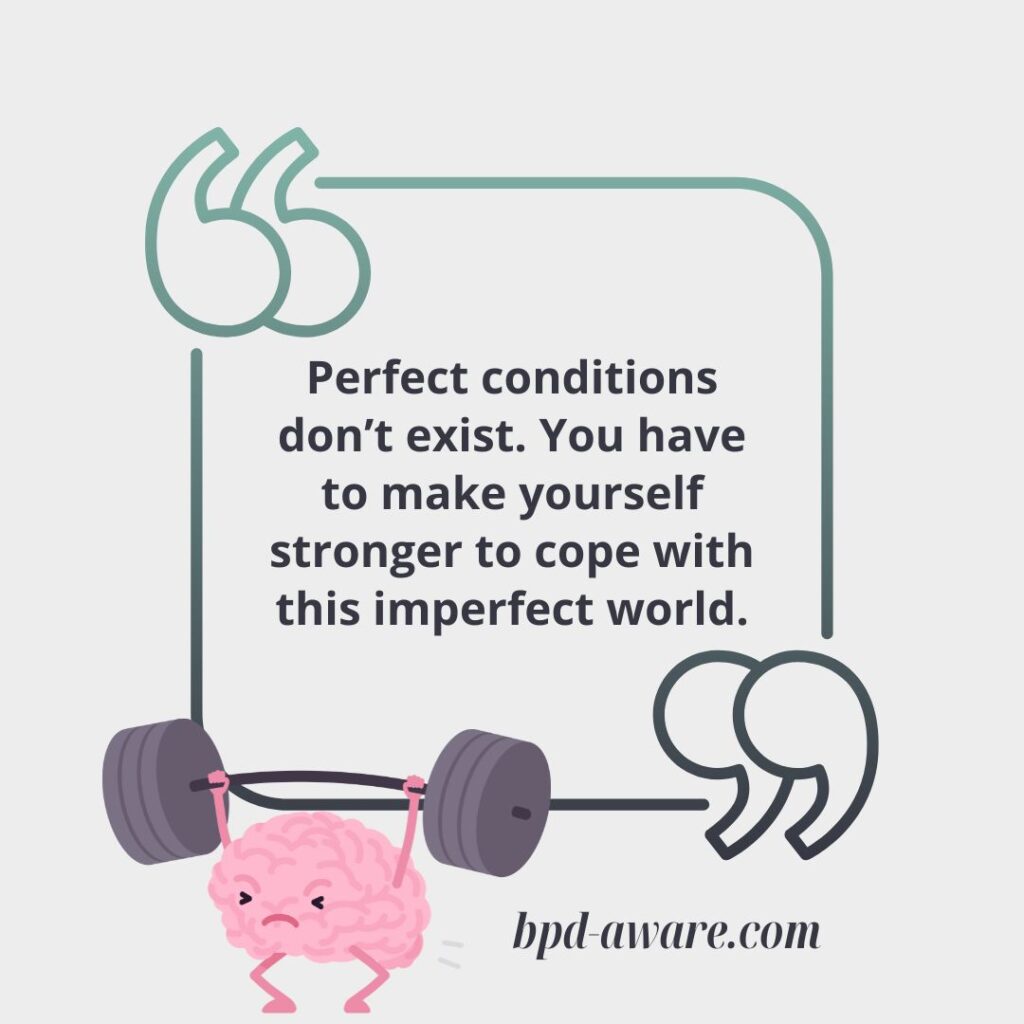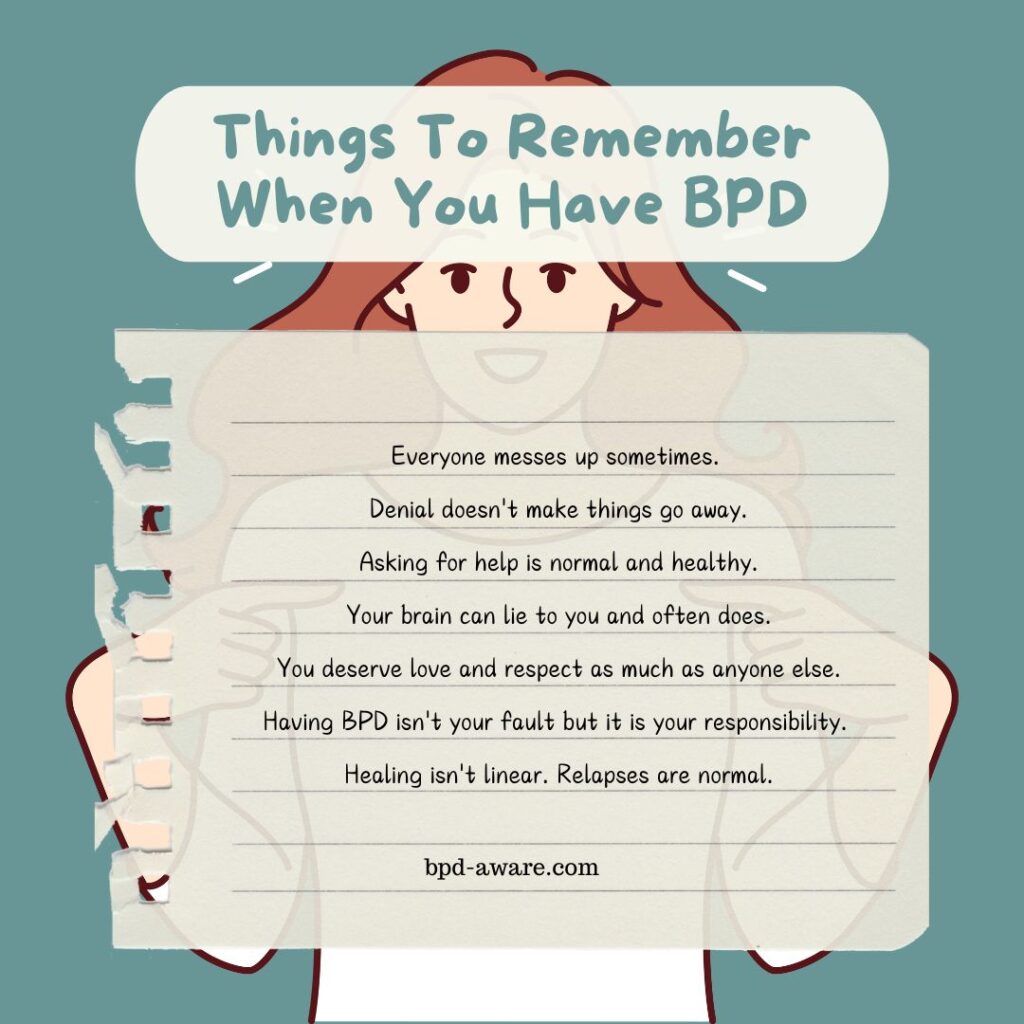When you’re living with Borderline Personality Disorder (BPD), your mind can play tricks on you and make you forget a great number of important things. These are things that can help guide you back onto the right path if you’ve lost your way or keep you on the path when you’re doing well.
So here are a few important things to remember when you have BPD, whether you’re going through the bad times or the good right now.
Denial doesn’t make things go away.
Denying that you have a problem or that you need help doesn’t make the problem go away. BPD is challenging enough to cope with when you have the proper help and support you need. Denying yourself this aid only makes things worse.
Accepting that you have Borderline Personality Disorder and that you need treatment and support is the biggest step you can make on your road to recovery. By embracing your reality, even if it’s not the reality you want, you are giving yourself control over your destiny. By taking control you can begin to shape your reality to the one you want.
Everyone messes up sometimes. It’s how you bounce back that matters.
There are no perfect human beings. Things go wrong, mistakes are made, and shit happens. This isn’t just true of people with BPD, it’s true for all of us. When you have BPD, you might mess up a little more than the average person but the important thing is that you live and you learn from everything you do. A mistake is only truly a mistake if you don’t learn from it. Each step you make in your journey, no matter how small, is still a step in the right direction. You might not even realize you’re walking the right path until you look behind you and see how far you’ve come.

Exiting a situation or discussion that is causing you intense distress isn’t “losing”.
Leaving discussions, situations, or people that cause you continually cause you intense distress isn’t admitting defeat, it’s a show of power. Whether it’s a short-term or long-term decision to leave, you are showing that you respect yourself enough not to put yourself in conditions that make your mental health worse.
This decision reflects your maturity and self-awareness. Prioritizing your mental health is never losing, it’s winning.
Asking for help is normal and healthy.
Living with BPD can make you feel incredibly vulnerable, so reaching out for support can feel intimidating. Asking for help is one of the bravest things any of us to do. There may be a rejection or two, and those do hurt, but you’d be surprised by how many people are more than happy to go out of their way to help a loved one.
We all need help at times and asking for it isn’t a sign of weakness, it’s a sign of strength. You’re telling those people that you want to grow and be a better person. Not only are you helping yourself, but you’re helping remove the stigma that often surrounds mental illness so that other people find it easier to ask for help in the future.
Your brain can lie to you and often does.
Borderline Personality Disorder causes intense emotions and distorted thoughts that don’t always match reality. This is true of both the highs and the lows of living with BPD. It’s important to remember that not every thought or feeling reflects objective reality. Your BPD brain can lie to you and tell you you’re worthless, unloved, or hopeless when none of these things are true.
Challenge your extreme thoughts and feelings and ask if they correspond with Walking The Middle Path. Ask loved ones and mental health professionals for their opinions.
By acknowledging that your thoughts and feelings can be deceptive you are fighting for clarity and taking control over your life.
Medication has to be taken as prescribed.
If you’ve been prescribed medication, it’s for a good reason. Generally speaking, when you have BPD, medication is prescribed to stabilize your moods, reduce impulsivity, or treat co-occurring conditions such as depression and anxiety. You might have bad days where you feel like your medication isn’t working. Likewise, you may have days where you feel fantastic and believe that you don’t need your medication anymore. However, it’s vital to still take your medication as it has been prescribed. Coming off medication without a plan can cause drastic swings.
If you truly believe that your medication isn’t helping you, please talk to the health professional who prescribed you the medication and explain your concerns.
If you forget to take your medication for a day, generally this isn’t a massive concern, however, you are still best off speaking to your healthcare provider about the best course of action.
You deserve love and respect as much as anyone else.
Living with Borderline Personality Disorder can make you feel isolated or unworthy of love at times. Remember what we said earlier though, your brain can and will lie to you, perhaps more often than you realize.
Your value as a human being isn’t in any way diminished by the struggles you fight daily. If anything, your strength in coping with BPD is something to be admired. Certain aspects of BPD can make it more difficult to find and retain a romantic partner but that doesn’t mean you don’t deserve love and respect.
When you do find the love and respect you deserve, allow yourself to receive. Don’t push it away out of some kind of fear of abandonment.
Receiving love and respect doesn’t just mean other people either. You deserve to love and respect yourself. This is the ultimate kindness you can give yourself.
Having BPD isn’t your fault but it is your responsibility.
No one chooses to have BPD. Mental health professionals believe that BPD is typically caused by a combination of genetic and environmental factors at an early age, something children don’t have any control over. That means that having Borderline Personality Disorder isn’t your fault.
HOWEVER, having BPD is your responsibility. By that, I mean that you now know you have a mental health condition, and it’s your responsibility to work on yourself and work on your recovery. How you choose to go about this is your business, but simply blaming everything on having BPD and then not working on it means you’re not likely to ever improve.

Healing isn’t linear. Relapses are normal.
It would be fantastic if all our efforts were immediately rewarded with the results we desire. Those kinds of outcomes are exceedingly rare in life though, especially when it comes to mental health. Recovery takes a lot of time and effort.
Even in recovery, you will have setbacks. Setbacks aren’t failures, they’re bumps in the road that you need to discover a way over or around. They’re a chance to grow and learn so that, next time, the bump feels a little smaller and a little more manageable. Eventually, those bumps might not feel like bumps at all.
Again, treat yourself with love and respect. Accept that you’ve had a bad spell and pledge to make tomorrow better.
Sources, Resources, and Further Reading
- 8 Things to Remember When You Have BPD: https://www.talkingaboutbpd.co.uk/post/7-things-to-remember-when-you-have-bpd
- 5 Things To Remember When You Have BPD: https://suzannewallach.com/blog/5-things-to-remember-when-you-have-bpd/
- 7 Ways to Live with Borderline Personality Disorder: https://www.thenewhopemhcs.com/7-ways-to-live-with-borderline-personality-disorder/
















